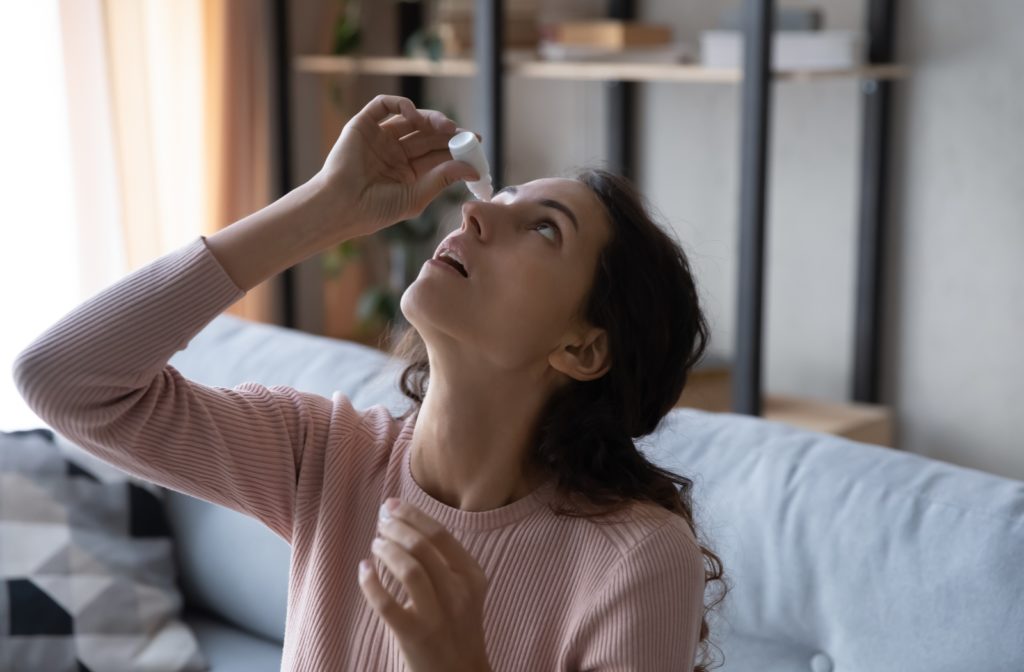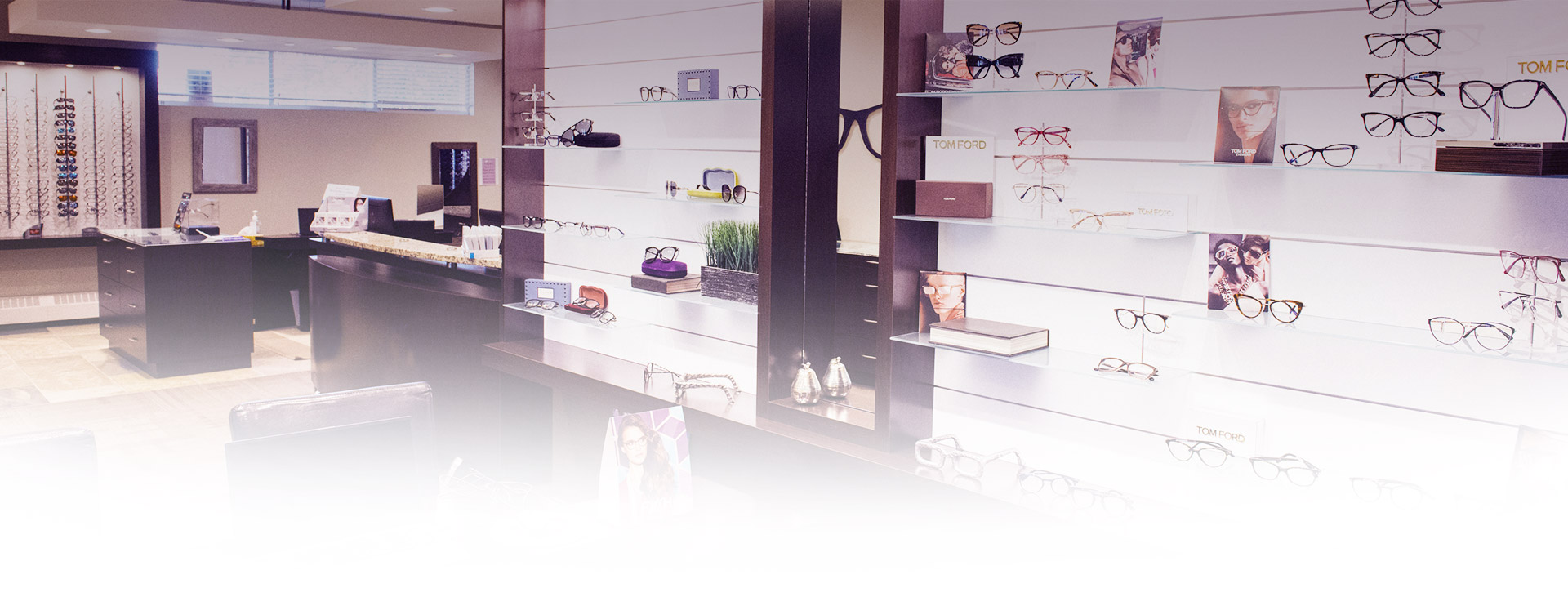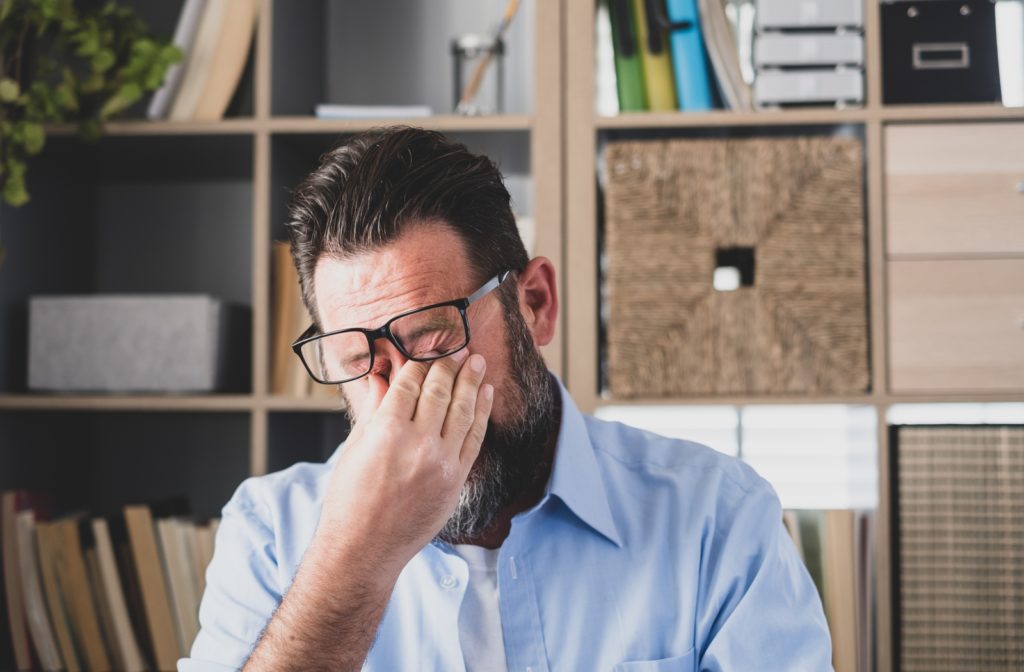If you’re experiencing dry, irritated eyes, what’s causing these symptoms? While your optometrist can help identify any problems, you may need to think about your mental health. Stress and anxiety can impact your body in several ways, and some experts believe it can affect dry eye disease development.
Can stress and anxiety lead to dry eyes? Continue reading to learn more about this condition, including its causes and possible treatments.
What is Dry Eye Disease?
Dry eye disease is a condition where your tears cannot properly moisten your eyes. Your tear film helps keep the surface of your eye clean and free of debris, but complications can arise, leading to inflamed and irritated eyes.
An issue relating to one of the tear film’s layers (oil, aqueous fluid, and mucin) can cause several symptoms to develop, including:
- Stinging or burning eyes
- Light sensitivity
- Red eyes
- Difficulty wearing contact lenses
- Difficulty driving at night
- Watery eyes
- Blurred vision
- Eye fatigue
Dry eyes are irritating and can affect your quality of life. Complications within your tear film can occur because of many factors, both internal and external, such as age. Stress can put a strain on your health, but can it lead to dry eyes as well?
Can Stress & Anxiety Cause Dry Eyes?
Stress and anxiety aren’t known as common causes of dry eyes, but several studies are showing there may be a connection.
One study of 106 patients tested the link dry eye disease can have with sleep quality, anxiety, and depression. Researchers completed tear film analysis, corneal staining, and other necessary tests to achieve their results.
This study found that patients with dry eye disease had higher depression and anxiety scores, and those with severe dry eye symptoms had higher anxiety levels.
A study in Turkey discovered a possible link between mental health and dry eye disease. It found that people with depression, anxiety, and stress are more likely to experience dry eyes.
Another study of 209 students evaluated the relationship between stress and dry eye disease. This study discovered that 27% of students had dry eye disease and that these students had significantly higher levels of stress. Other findings showed that wearing contact lenses and frequent computer use can affect dry eye disease development.
Stress and anxiety may cause you to develop dry eyes, but this condition is multifactorial. There are other causes of dry eye disease you should understand.

Other Causes of Dry Eyes
If you’re experiencing symptoms of dry eye disease, there may be other factors affecting you. Many things can contribute to dry eyes, but the causes include decreased tear production or increased tear evaporation.
Decreased Tear Production
You tend to produce fewer tears with age, making it harder for your tears to moisten your eyes. Besides this, other conditions may affect tear production, including:
- Certain medical conditions
- Side effects from medications
- Desensitized corneal nerves
Increased Tear Evaporation
Increased tear evaporation occurs when issues arise within the oily layer of your tear film. This layer of the tear film helps to protect your tears from evaporating each time you blink. When there are issues, it can lead to your tears evaporating too quickly, leaving you with dry eyes.
The glands in your eyelids help to release this oil when you blink, but they can become blocked or clogged. When this happens, it’s known as meibomian gland dysfunction. Other factors can contribute to tear evaporation, such as:
- Infrequent blinking
- Wind, smoke, or dry air
- Vitamin A deficiency
- Posterior blepharitis
- Eye allergies
- Eyelid problems (ectropion & entropion)
There are many potential causes of dry eye disease, including stress and anxiety, so how do you treat this condition? Because this condition is multifactorial, there are several treatments available to manage dry eyes.
Treating Dry Eye Disease
While dry eyes are usually chronic, there are several ways to manage this condition. After conducting a comprehensive eye exam and evaluating your tear film with specialized equipment, your optometrist can recommend a customized treatment plan.
Whether it be in-office or at-home treatments, there are solutions for your needs. These treatments can include:
iLux
iLux treatment uses gentle heat and pressure to remove blockages in the glands that release oil to protect your tears from evaporating. This heat treatment comes from a handheld device that treats these glands in roughly 10 minutes.
Punctal Plugs
Punctal plugs help to block tear drainage in your eyes. Blocking tears from draining too quickly helps to keep your eyes moist for longer. These plugs can be temporary or last several years.
At-Home Treatments
Besides in-office treatments, there are several ways to manage dry eye disease without leaving your home. These options include:
- Prescription eye drops
- Eyelid wipes
- Omega supplements
- Eye masks
Regardless of the treatment your optometrist recommends, you can manage irritating dry eye symptoms. Dry eyes can happen to anyone, but you don’t need to suffer through them. If you’re experiencing symptoms of dry eye disease, book an appointment.



